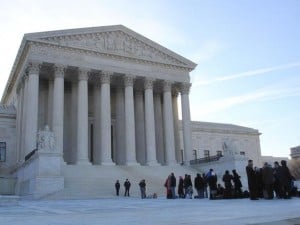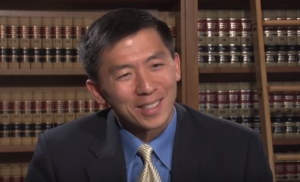Joshua Matz
-
 Government
GovernmentTrump Is Characteristically Gross And Weird About Sexual Assault In Unsealed Deposition
Garbage men gonna garbage men. -
 Non-Sequiturs
Non-SequitursNon Sequiturs: 04.28.19
* Adam Feldman poses — and answers — an interesting question: are particular justices more or less partial to certain lawyers’ or law firms’ positions? [Empirical SCOTUS]
* Speaking of the federal judiciary, Carrie Severino offers this helpful scorecard of President Donald Trump’s track record on judicial appointments — which underscores, as she notes, the importance of the 2020 elections. [Bench Memos / National Review]
* And speaking of President Trump, Joshua Matz and Laurence Tribe have this excellent explanation of why the Supreme Court does not have a role in adjudicating impeachments. [Take Care]
* In the wake of the Mueller Report, Ilya Somin pushes back against conventional wisdom and takes this position: “Not all foreign interference in elections is unjustified. Far from it, in fact.” [Volokh Conspiracy / Reason]
* Fair use in the copyright context is an infamously amorphous concept — so the Fourth Circuit’s recent ruling in Brammer v. Violent Hues Productions deserves your attention. [All Rights Reserved]
* Congratulations to Westlaw Edge, voted the “best new analytics product” by the readers of Dewey B Strategic. [Dewey B Strategic]
* And congrats to Kira Systems on being picked by Bryan Cave Leighton Paisner as its AI solution for “high-volume workstreams” across the firm. [Artificial Lawyer]
* If you’re a libertarian-leaning lawyer with two to six years of experience under your belt, check out these great employment opportunities over at IJ. [Institute for Justice via Volokh Conspiracy / Reason]
 Sponsored
SponsoredNavigating Financial Success by Avoiding Common Pitfalls and Maximizing Firm Performance
In this CLE-eligible webinar, we’ll explore the most common accounting pitfalls and how to avoid them for your firm.-
 Non-Sequiturs
Non-SequitursNon Sequiturs: 12.23.18
* Nancy Gertner and Laurence Tribe take Alan Dershowitz to task for his unorthodox analysis of the sentencing proceedings of General Michael Flynn. [Boston Globe]
* In this elegant essay, Jane Chong uses two notable new books — To End a Presidency: The Power of Impeachment, by Laurence Tribe and Joshua Matz, and the updated edition of Charles Black’s classic, Impeachment: A Handbook, with a new preface and additional chapters by by Philip Bobbitt (affiliate links) — as the jumping-off point for reflections on impeachment, law, and politics. [Los Angeles Review of Books]
* Judges often struggle when it comes to sentencing — and that’s as it should be, according to veteran defense lawyer and former prosecutor Joel Cohen. [New York Law Journal]
* Yes, more of President Donald Trump’s judicial nominees have been rated “not qualified” by the American Bar Association compared to the nominees of his four most-recent predecessors — but as Patrick Gregory explains, there are some reasons for this (most notably, the Trump Administration’s decision to stop giving the ABA a sneak peek at nominees, which allowed past administrations to simply pull nominees the ABA deemed unqualified). [Big Law Business]
* Jonathan Adler has many problems with the recent ruling by Judge Reed O’Connor (N.D. Tex.) on the constitutionality of the Affordable Care Act — including the fact that Judge O’Connor ruled in the first place. [Volokh Conspiracy / Reason]
* Former public defender Stephen Cooper flags an issue that many reporters probably haven’t thought much about: “When Will Journalism Grapple With the Ethics of Interviewing Mentally Ill Arrestees?” [CounterPunch]
* As 2018 draws to a close, the U.S. Chamber offers up its annual list of the year’s Top 10 Most Ridiculous Lawsuits.
[Faces of Lawsuit Abuse]* Looking ahead to 2019, the new year could ring in new legislation that could help lower drug prices by facilitating the timely entry of generics into the market, as Alaric DeArment reports. [MedCity News]
-
 Boutique Law Firms, Lateral Moves, Litigators, Small Law Firms
Boutique Law Firms, Lateral Moves, Litigators, Small Law FirmsGroundbreaking New Boutique Hires Legal Wunderkind
Will this hot new boutique become the destination of choice for prominent progressive lawyers? -
 Non-Sequiturs
Non-SequitursNon-Sequiturs: 07.19.17
* The Supreme Court’s latest ruling in the travel ban litigation: good news for grandparents, bad news for certain refugees. [How Appealing]
* And in the travel ban battle, the parties aren’t pulling their punches. [Democracy in America / The Economist]
* Nor does Joshua Matz: “The Supreme Court is now a co-owner and co-author of the travel ban.” [Take Care]
* Justice Goodwin Liu and a team of Yale Law School researchers have issued an important new report about Asian Americans in the legal profession today. [The Portrait Project]
* A defense of that controversial David Brooks column about salami. [Volokh Conspiracy / Washington Post]
* And a defense of due process when it comes to allegations of sexual assault on college campuses. [The Federalist via Instapundit]
* In other higher-education news, here’s the tweet that got Nick Lutz suspended from the University of Central Florida. [Althouse]
* How do millennials view the legal industry? Drew Rossow and Elan Fields discuss. [Legal Tookit / Legal Talk Network]
-
 Non-Sequiturs
Non-SequitursNon-Sequiturs: 05.30.17
* Harvard law students go all out in everything they do — and lying is no exception. [New Yorker]
* If you’re looking to purchase ancillary legal services (e.g., business or litigation support), check out the Buying Legal Guide, just launched today by the Buying Legal Council and Legal.io. [Buying Legal Guide]
* Joshua Matz explains how and when the Supreme Court might review the Trump travel ban (aka “Muslim ban”). [Take Care via How Appealing]
* Speaking of the courts, here’s Professor Carl Tobias’s advice to President Donald Trump on how to fill those 100+ vacancies in the federal judiciary. [Washington and Lee Law Review Online]
* Why is flying such a miserable experience? Blame not just the lawyers but also the index funds, as Matt Levine explains. [Bloomberg View]
* A prominent professor sues Columbia Law School, alleging age discrimination. [TaxProf Blog]
* Professor Eugene Volokh explains the First Amendment to government officials: “no, the government may not deny permits for speech because it views the speech as promoting ‘bigotry or hatred.'” [Volokh Conspiracy / Washington Post]
* Additional thoughts on what TC Heartland means for venue in patent cases, from IP columnist Gaston Kroub. [On the Docket / George Washington Law Review]
-
 Justice, Law Schools, Politics
Justice, Law Schools, PoliticsLaw Professors Take On The Trump Administration
Law professors have an important role to play in government accountability. -
 Non-Sequiturs
Non-SequitursNon-Sequiturs: 03.16.17
* What does the future hold for the U.S. Supreme Court? Analysts (including yours truly) opine. [Bloomberg BNA via Storify]
* Another prediction of ours has come to pass: congrats to Sullivan & Cromwell partner Brent McIntosh on his nomination as general counsel for the Treasury Department. [Corporate Counsel]
* Is it time to break up the Ninth Circuit (as President Trump recently called for)? Professors John Eastman and Brian Fitzpatrick say yay; Judges Sidney Thomas, Carlos Bea, and Alex Kozinski say nay. [House Judiciary Committee]
* Anthony Kronman: from dean of Yale Law School to “born-again pagan” (affiliate link). [New Yorker via How Appealing]
* Looking for smart, timely takes on the Trump Administration, from an all-star cast of law professors and legal experts? There’s a site for that. [Take Care]
* Guess who: “Cat-loving judge makes case that has nothing to do with cats all about cats.” [Chicago Tribune]
* Professor Orin Kerr chats with Professor Barry Friedman about Friedman’s latest book, Unwarranted: Policing Without Permission (affiliate link). [Volokh Conspiracy]
* The current SCOTUS Term isn’t super-sexy — but there are a few interesting cases on the docket, as Adam Feldman points out. [Empirical SCOTUS]
* Attention 2Ls & 3Ls, here’s a cool contest — with $100K in scholarships as prizes! [PR Newswire (press release)]
 Sponsored
SponsoredLegal AI: 3 Steps Law Firms Should Take Now
If 2023 introduced legal professionals to generative AI, then 2024 will be when law firms start adapting to utilize it. Things are moving fast, so…-
 Laurence Tribe, Lawyerly Lairs, Real Estate
Laurence Tribe, Lawyerly Lairs, Real EstateLawyerly Lairs: Professor Laurence Tribe's $3.4 Million Mansion
The eminent constitutional scholar has a lovely, albeit eccentrically decorated, home. -
 Fabulosity, Rankings, Technology
Fabulosity, Rankings, Technology30 Under 30: The Top Young Lawyers And Policymakers (2016)
See a name that you know? If so, congratulate them! -
Gay Marriage, SCOTUS, Supreme Court
Why The Same-Sex Marriage Decision Will Likely Come Out On June 26
Will June 26 become known as "Justice Anthony Kennedy Day" for the LGBT community? -
Environment / Environmental Law, Laurence Tribe, Law Professors
Et Tu, Laurence Tribe?
Why is a leading liberal legal scholar coming to the defense of Big Coal? -
Fabulosity, Rankings
30 Under 30: The Top Young Lawyers And Policymakers (2015)
Know anyone on this august list? If so, congratulate them!
Sponsored

Early Adopters Of Legal AI Gaining Competitive Edge In Marketplace

Navigating Financial Success by Avoiding Common Pitfalls and Maximizing Firm Performance

Legal AI: 3 Steps Law Firms Should Take Now
Sponsored

The Business Case For AI At Your Law Firm


Is The Future Of Law Distributed? Lessons From The Tech Adoption Curve
-
Antonin Scalia, Books, Fabulosity, Parties, SCOTUS, Sonia Sotomayor, Supreme Court
Scalia On Sotomayor: 'I Knew She'd Be Trouble'
Did the Wise Latina engage in unwise behavior at a Supreme Court party? -
Biglaw, Laurence Tribe, Pro Bono, Ruth Bader Ginsburg, SCOTUS, Supreme Court
Professor Laurence Tribe Calls Out Biglaw Pro Bono And Shares His Take On The Roberts Court
Professor Tribe spoke at the UJA-Federation last night and provided an awesome evening of reflection upon his career, his take on the Supreme Court, and his plea to Biglaw. -
Antonin Scalia, Biglaw, Job Searches, John Roberts, Kids, Money, Morning Docket, Partner Issues, Partner Profits, SCOTUS, Small Law Firms, Solo Practitioners, Supreme Court
Morning Docket: 07.07.14
* If you’ve been dying to know what the partner compensation spread looks like at your firm, then we’ve got your fix. Check out the insane 23 to 1 spread over at Perkins Coie. [Am Law Daily]
* “It’s a complete structural change, and it’s not going away. The end result is fewer graduates, and fewer law schools.” With enrollment still dropping, the end seems near. [Boston Globe]
* “I predicted the collapse of legal education, but I didn’t quite predict how bad it would be.” Dean Frank Wu of UC Hastings Law is fighting his way out of a rankings slump. Good luck. [The Recorder]
* Widener is the latest law school to roll out a solo / small firm incubator. Only grads from the class of 2014 may apply. Earlier grads are ineligible because they presumably have jobs… maybe. [PennLive.com]
* A judge has denied bail for the Georgia man accused of sending sext messages during his seven-hour work day while his 22-month-old son was left to die in his hot car. Ugh, this is terribly sad news. 🙁 [CNN]
-
2nd Circuit, Antonin Scalia, Benchslaps, Books, Jed Rakoff, Non-Sequiturs, Securities and Exchange Commission, Supreme Court, Technology
Non-Sequiturs: 06.09.14
* Jury duty is the only major civic duty that no one ever talks about. Professor Andrew Ferguson would like to change that by encouraging jurors to speak up about their experience. Enjoy learning how the sausage of justice is made! [Huffington Post] * Verizon threatens to sue Netflix for honestly reporting how bad Verizon’s […]